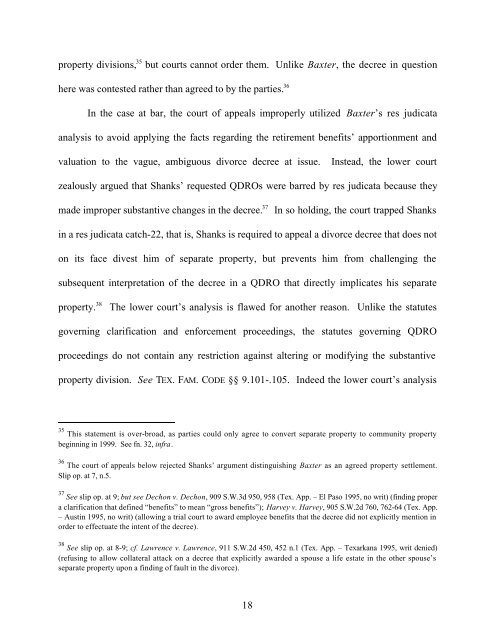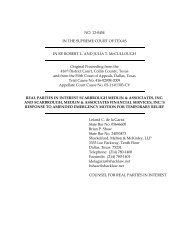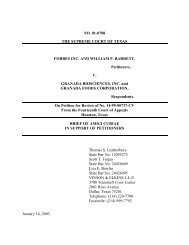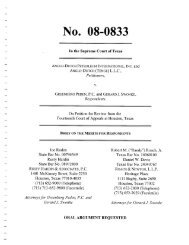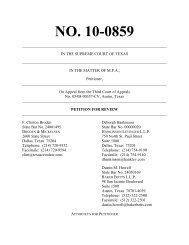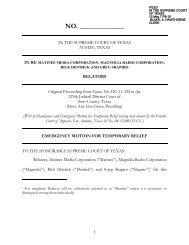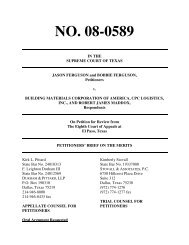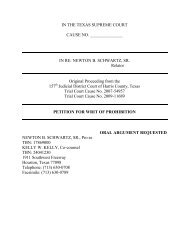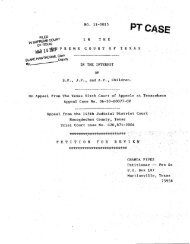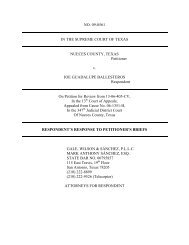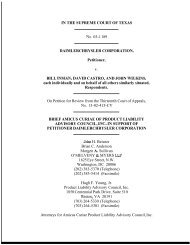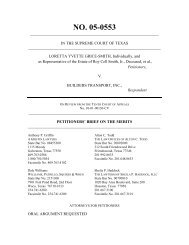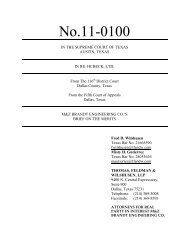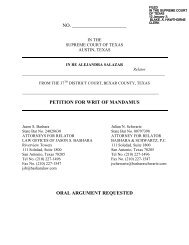Petitioner's Brief on the Merits - Supreme Court of Texas
Petitioner's Brief on the Merits - Supreme Court of Texas
Petitioner's Brief on the Merits - Supreme Court of Texas
Create successful ePaper yourself
Turn your PDF publications into a flip-book with our unique Google optimized e-Paper software.
property divisi<strong>on</strong>s, 35 but courts cannot order <strong>the</strong>m. Unlike Baxter, <strong>the</strong> decree in questi<strong>on</strong><br />
here was c<strong>on</strong>tested ra<strong>the</strong>r than agreed to by <strong>the</strong> parties. 36<br />
In <strong>the</strong> case at bar, <strong>the</strong> court <strong>of</strong> appeals improperly utilized Baxter’s res judicata<br />
analysis to avoid applying <strong>the</strong> facts regarding <strong>the</strong> retirement benefits’ apporti<strong>on</strong>ment and<br />
valuati<strong>on</strong> to <strong>the</strong> vague, ambiguous divorce decree at issue. Instead, <strong>the</strong> lower court<br />
zealously argued that Shanks’ requested QDROs were barred by res judicata because <strong>the</strong>y<br />
made improper substantive changes in <strong>the</strong> decree. 37<br />
In so holding, <strong>the</strong> court trapped Shanks<br />
in a res judicata catch-22, that is, Shanks is required to appeal a divorce decree that does not<br />
<strong>on</strong> its face divest him <strong>of</strong> separate property, but prevents him from challenging <strong>the</strong><br />
subsequent interpretati<strong>on</strong> <strong>of</strong> <strong>the</strong> decree in a QDRO that directly implicates his separate<br />
property. 38<br />
The lower court’s analysis is flawed for ano<strong>the</strong>r reas<strong>on</strong>. Unlike <strong>the</strong> statutes<br />
governing clarificati<strong>on</strong> and enforcement proceedings, <strong>the</strong> statutes governing QDRO<br />
proceedings do not c<strong>on</strong>tain any restricti<strong>on</strong> against altering or modifying <strong>the</strong> substantive<br />
property divisi<strong>on</strong>. See TEX. FAM. CODE §§ 9.101-.105. Indeed <strong>the</strong> lower court’s analysis<br />
35 This statement is over-broad, as parties could <strong>on</strong>ly agree to c<strong>on</strong>vert separate property to community property<br />
beginning in 1999. See fn. 32, infra.<br />
36 The court <strong>of</strong> appeals below rejected Shanks’ argument distinguishing Baxter as an agreed property settlement.<br />
Slip op. at 7, n.5.<br />
37 See slip op. at 9; but see Dech<strong>on</strong> v. Dech<strong>on</strong>, 909 S.W.3d 950, 958 (Tex. App. – El Paso 1995, no writ) (finding proper<br />
a clarificati<strong>on</strong> that defined “benefits” to mean “gross benefits”); Harvey v. Harvey, 905 S.W.2d 760, 762-64 (Tex. App.<br />
– Austin 1995, no writ) (allowing a trial court to award employee benefits that <strong>the</strong> decree did not explicitly menti<strong>on</strong> in<br />
order to effectuate <strong>the</strong> intent <strong>of</strong> <strong>the</strong> decree).<br />
38 See slip op. at 8-9; cf. Lawrence v. Lawrence, 911 S.W.2d 450, 452 n.1 (Tex. App. – Texarkana 1995, writ denied)<br />
(refusing to allow collateral attack <strong>on</strong> a decree that explicitly awarded a spouse a life estate in <strong>the</strong> o<strong>the</strong>r spouse’s<br />
separate property up<strong>on</strong> a finding <strong>of</strong> fault in <strong>the</strong> divorce).<br />
18


